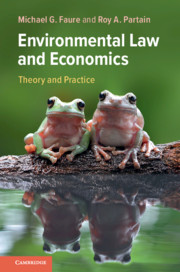Book contents
- Environmental Law and Economics
- Environmental Law and Economics
- Copyright page
- Contents
- Preface
- Acknowledgements
- Abbreviations
- 1 Introduction
- 2 Environmental Harm and Efficiency
- 3 Property Rights Approach to Environmental Law
- 4 Environmental Standard Setting
- 5 Principles of Environmental Law and Environmental Economics
- 6 Pricing Environmental Harm
- 7 Market-Based Instruments
- 8 Liability Rules
- 9 Environmental Regulation
- 10 Environmental Crime
- 11 Insurance for Environmental Damage
- 12 Compensation for Environmental Damage
- 13 Environmental Federalism
- 14 The Role of Environmental Law in Developing Countries
- 15 Epilogue
- References
- Index
13 - Environmental Federalism
Published online by Cambridge University Press: 13 September 2019
- Environmental Law and Economics
- Environmental Law and Economics
- Copyright page
- Contents
- Preface
- Acknowledgements
- Abbreviations
- 1 Introduction
- 2 Environmental Harm and Efficiency
- 3 Property Rights Approach to Environmental Law
- 4 Environmental Standard Setting
- 5 Principles of Environmental Law and Environmental Economics
- 6 Pricing Environmental Harm
- 7 Market-Based Instruments
- 8 Liability Rules
- 9 Environmental Regulation
- 10 Environmental Crime
- 11 Insurance for Environmental Damage
- 12 Compensation for Environmental Damage
- 13 Environmental Federalism
- 14 The Role of Environmental Law in Developing Countries
- 15 Epilogue
- References
- Index
Summary
This chapter is in many ways a chapter that reaches interesting abstractions on the nature of power, rights, and of constitutionalism, all in the interests of environmental law. We began with a discussion on Tiebout, who argued that when people with the same preferences cluster together in communities, that competition between local authorities will, under certain restrictive conditions, lead to allocative efficiency. This implies a market in jurisdictions and in states competing in public goods and services. Van den Bergh’s model forecasts a 'bottom up federalisation', wherein the default assumption is that the best level of governance is at the most local level available, unless it is otherwise demonstrable that the particular environmental issue cannot be sufficiently resolved at that level of government. Another point that we addressed is the issue of centralisation, of whether all actors should be required to comply with a singular jurisdiction-wide regulatory requirement to prevent an environmental problem (centralisation), or, should they be allowed to individually discover their own most efficient method of preventing the environmental problem (decentralisation).
Keywords
- Type
- Chapter
- Information
- Environmental Law and EconomicsTheory and Practice, pp. 275 - 291Publisher: Cambridge University PressPrint publication year: 2019



